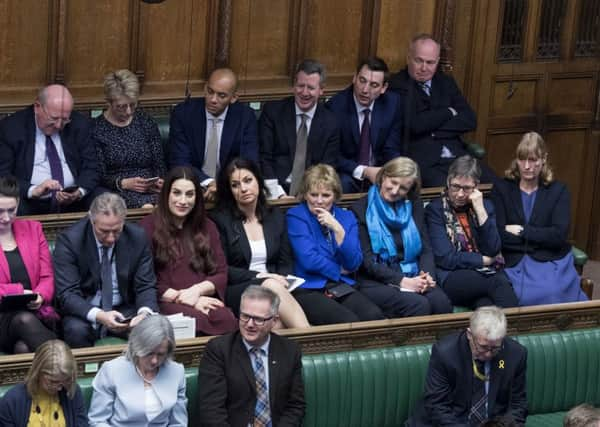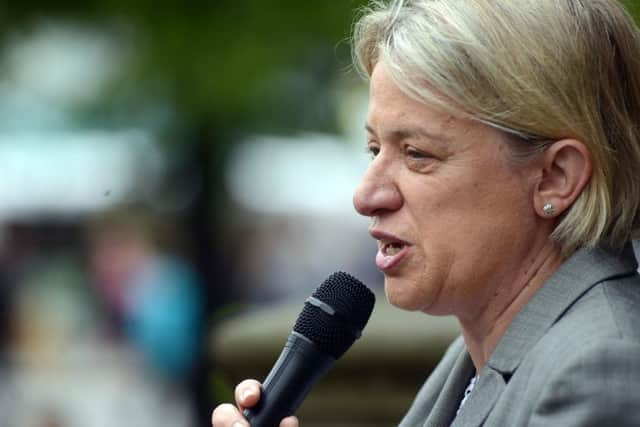Natalie Bennett: Why Independents and their rebel alliance will only succeed if there’s electoral reform


I then went through the Channel Tunnel on the Eurostar, and by the time I’d emerged, it was not longer the “Labour split”, but the “Tory and Labour split”, with three Conservative women MPs joining the group. Fast change is a characteristic of our politics today, as is complexity. And chaos.
Yet it was telling that Brexit was just one of many issues cited in the resignation statements. It is more of a symptom of the country’s problems than the cause.
Advertisement
Hide AdAdvertisement
Hide Ad

The two largest parties, whose influence usually outweighed their votes due to the first-past-the-post electoral system, were traditionally spread (with considerable overlap between them) across the axis of economic politics: the Tories the party of big business and the banks, Labour the party of their workers.
That always left lots of people out in the cold: small business has been totally, thoroughly shafted over decades by not having a party to represent their interests. Hence an economy in which the playing field has been substantially slanted in favour of the Amazons and Tescos, against your corner greengrocer and local bookshop.
Those not in paid employment (and even just not in full-time paid employment, most of them women) have been left in the cold by Labour who’ve shown scant interest for family carers.
Advertisement
Hide AdAdvertisement
Hide AdAnd there are other axes running through politics like the authoritarian/libertarian division. All too often Labour and Tory competed to appear to be the most authoritarian – Tony Blair might have talked about being “tough on the causes of crime”, but he acted largely as “tough on crime”, bringing in the disastrous ASBOs which criminalised some of the most vulnerable in society.
There’s also an environmental axis, with at one end those who appreciate we have reached the physical limits of this fragile planet, and at the other those who assume, wrongly, that you can have infinite growth on a finite planet.
But there is one unarguable conclusion from the creation of The Independent Group and this broader state of affairs – our antique first-past-the-post electoral system is well past its use-by date.
More, it has created a Parliament dominated by two unstable, angry coalitions in the Labour and Conservative parties. It has created the monster that is the DUP veto on all of our futures. It has made the UK ungovernable, unable to act as that inexorable Brexit clock ticks down.
Advertisement
Hide AdAdvertisement
Hide AdIf you consider the political conditions in the UK, the US and Australia – all non-proportional systems – it is clear where one of our chief underlying problems lies. The system in Westminster hasn’t seen significant reform in a century since women got the vote. Yet this is a system in which the views of MPs don’t match the views of voters, and huge numbers of voters are stranded in “safe seats” where their vote never counts.
Mature democracies in most of the developed world have proportional electoral systems where the views of people, and MPs, find representation in more cohesive, politically coherent parties that produce stability, transparency and responsible government, not angry splits and backroom stitch-ups.
The five most stable states in the world, Sweden, Switzerland, Norway, Finland and Denmark, are all proportional. And New Zealand presents a model of a successful switch from the antique Westminster approach to a modern proportional one.”
We have stumbled to our current constitutional arrangements through historical accident. Often what were meant to be short-term arrangements have lasted for centuries. It is no wonder it is such a mess.
Advertisement
Hide AdAdvertisement
Hide AdWhen it comes to change, however, we have the “turkeys voting for Christmas” problem. MPs, many sitting pretty in safe seats, there for life if they want it, are unlikely to unilaterally decide to vote to make their lives more uncertain.
That’s where we all as individuals and members of organisations – like the brilliant, young, fast-growing Make Votes Matter – come in. We, the people, need to tell the politicians down in Westminster that we’re not going to accept the “Mother of all Parliaments” being an undemocratic, unrepresentative, dysfunctional playground of squabbling infants. That Green Party election broadcast of 2015 showing our “leaders” as just that now looks more like documentary than satire.
We have to tell candidates that we will only vote for them if they are committed, whatever their party’s stance, to backing making Britain a democracy with a fair voting system, and to devolving power and resources from Westminster back to local communities.
Natalie Bennett is a former leader of the Green Party. She lives in Sheffield.